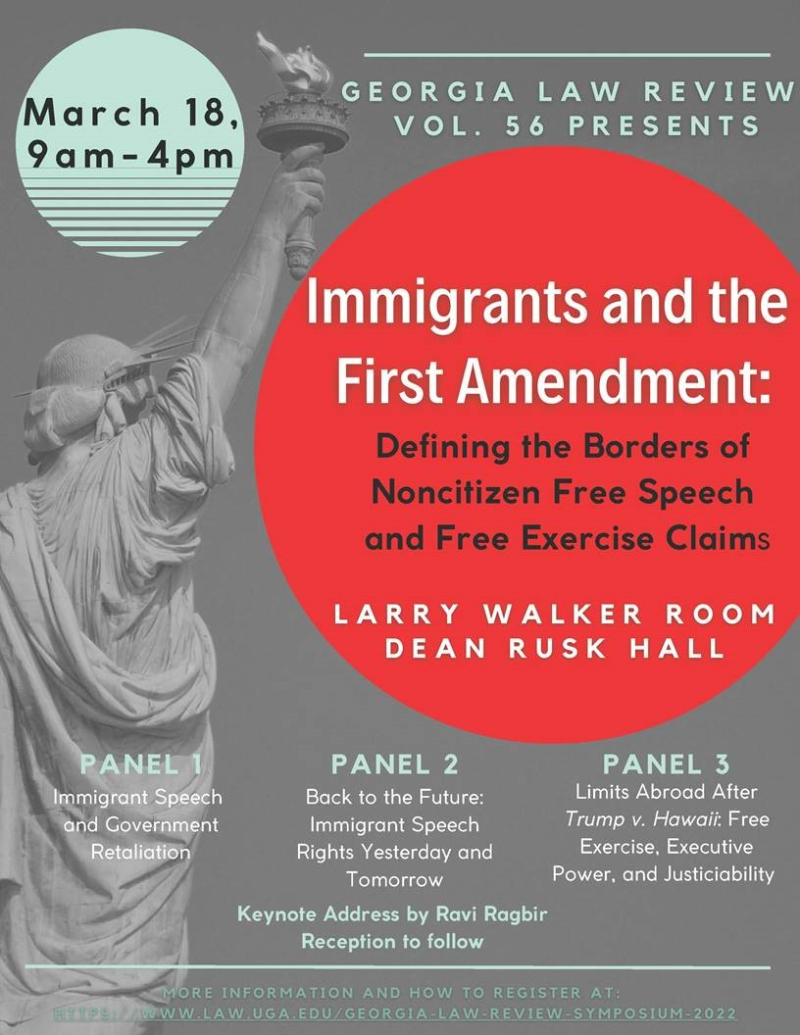Organized by the Georgia Law Review, “Immigrants and the First Amendment: Defining the Borders of Noncitizen Free Speech and Free Exercise Claims,” was held on March 18, 2022. The Symposium was an academic discussion of how immigration law, as well as immigrant activism, are intersecting with the First Amendment in new and surprising ways. This year’s Georgia Law Review Symposium brought together a diverse set of voices to discuss these exciting new crossovers, providing a forum to explore the nuances of the First Amendment’s scope as applied to immigrants, immigrant advocates, and potential immigrants outside of the country. The symposium featured a keynote address by noted immigration advocate Ravi Ragbir.
| 2022 | ||
| Friday, March 18th | 9:10 AM |
Panel I: Immigrant Speech and Government Retaliation Alina Das, NYU School of Law Larry Walker Room, Dean Rusk Hall 9:10 AM - 10:35 AM Despite being entitled to First Amendment rights, immigrants, particularly those without documentation, are highly vulnerable to government suppression of, or retaliation against, their exercise of free speech rights. Recent or ongoing cases in this area include Oldaker v. Giles in the Middle District of Georgia, which concerns first amendment claims brought on behalf of women alleging retaliation for medical abuse at an immigration detention center; and Ragbir v. Homan, which concerns the government’s retaliatory deportation of prominent immigrant rights activists. |
10:35 AM |
Panel 2: Back to the Future: Immigrant Speech Rights Yesterday and Tomorrow Michael Kagan, University of Nevada, Las Vegas Larry Walker Room, Dean Rusk Hall 10:35 AM - 12:00 PM From John Lennon to Charlie Chaplin to many less famous immigrants, United States immigration history is riddled with deportation or exclusion decisions based on immigrants' expression. Looking to the future, it is possible that constitutional free speech rights are best shored up by legislative and administrative solutions. |
1:00 PM |
Christopher C. Lund, Wayne State University Law School Larry Walker Room, Rusk Hall 1:00 PM - 2:15 PM Trump v. Hawaii is the most recent high-profile iteration of immigration actions allegedly taken on the basis of religion. In addition to exploring first amendment issues respecting the religion of potential migrants, this panel will also cover issues relating to the differences in executive power as it pertains to potential immigrants as opposed to immigrants already on U.S. soil, as well as the difficulties associated with immigrants vindicating asserted constitutional rights from abroad. |
2:15 PM |
Ravi Ragbir Larry Walker Room, Rusk Hall 2:15 PM - 3:15 PM Keynote address by Ravi Ragbir, immigration advocate. From his website: "Long-time permanent resident, community activist, father, and husband, Ravi Ragbir, faces permanent exile from his life in the U.S. Ravi’s immigration story began when he came to the U.S. from Trinidad in February 1991 on a visitor’s visa. In 1994, he became a lawful permanent resident (green card holder). A 15-year green card holder, Ravi was detained and ordered deported in 2006 by an immigration judge—without a hearing—based on a conviction for fraud, which he is currently seeking to vacate, based on factual and legal errors in his trial. Through his own struggle to remain in the U.S., Ravi became active in supporting other immigrants who were facing similar challenges. Today, Ravi is a nationally recognized leader in the immigrant rights movement." |
|---|


